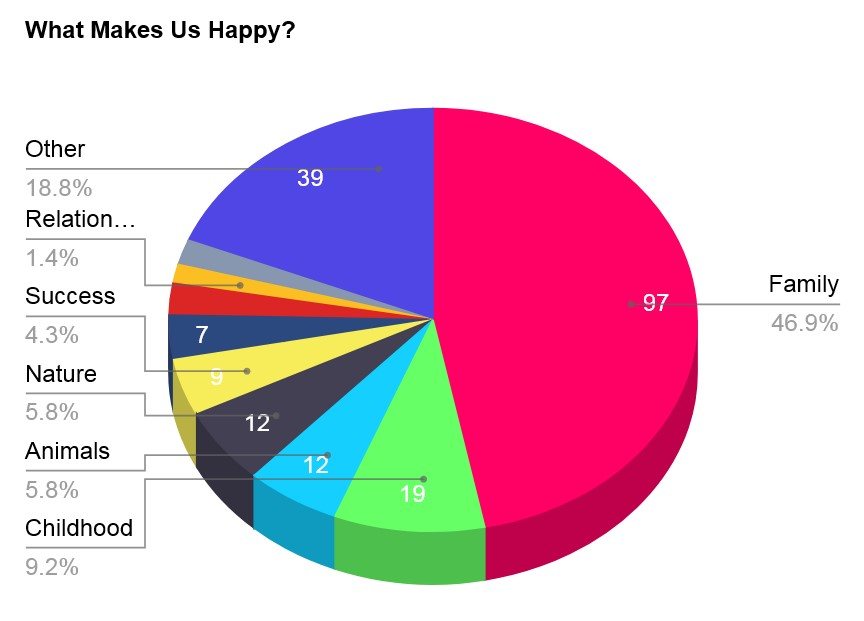What Makes Us Happy? An Experimental Thematic Analysis of 207 Happy Memories from Social Media Users
Silvia Hartmann, GoE.ac
This thematic analysis examines 207 anonymized happy memories shared by social media users in response to the prompt "What’s a memory that instantly makes you happy?" (collected on July 23, 2025). Using keyword-based categorization, we identified key themes, and calculated their frequency and percentages.
The goal was to provide a conversation starter, experimental example and proof of concept for modern response analysis using ROLE (Reports of Lived Experience) in conjunction with current AI pattern recognition abilities.
The Process
287 public responses to the question "What’s a memory that instantly makes you happy?" were collected in a text file. AI (Grok 4) was used to:
Remove personal details (names, user names, identifiable names within content)
Remove non-relevant responses (ads, spam, reasons for why the question was disliked, irrelevant responses). This left 207 responses, 72.13% for analysis. *On a busy, quick response social media platform, 72.13% positive, contributing responses to the question was unexpected.
Identify key themes & create categories
Ten categories were created as follows:
Family, Childhood, Pets/Animals, Nature/Outdoors, Achievements/Success, Travel/Experiences, Music/Art/Entertainment, Relationships/Romance, Sports/Events, Other
Categorisation
Themes were identified using keyword matching (e.g., "mom," "dad" for Family).
Some memories fit multiple themes but were assigned to a primary one (e.g. “My grandmother’s kitchen with all the aunts in there trying to help out with the food and dishes” was originally assigned to a “Food” category but was placed into “Family”).
"Other" captures diverse entries like abstract reflections, spiritual experiences or singular expressions.
Results
The 207 responses were categorized into the 10 themes, with the following results.
|
Theme
|
Count
|
Percentage
|
Description & Examples
|
|
Family
|
97
|
46.90%
|
Memories involving parents, children, grandparents, or family gatherings dominate, highlighting the emotional anchor of loved ones. Example: "My grandma & grandpa talking quietly so as not to wake me when I was about 5."
|
|
Childhood
|
19
|
9.2%
|
Memories of carefree youth, play, and simple joys. Example: "Sitting on the floor as a kid, legs crossed, Saturday morning cartoons playing ..."
|
|
Pets/Animals
|
12
|
5.8%
|
Heartwarming moments with animals. Example: "My dog, Emma, playing in the rain."
|
|
Nature/Outdoors
|
12
|
5.8%
|
Experiences in natural settings, evoking peace and wonder. Example: "Going deep sea fishing and leaving the channel to open ocean..."
|
|
Achievements/Success
|
9
|
4.3%
|
Moments of personal triumph or overcoming challenges. Example: "My first home run!"
|
|
Travel/Experiences
|
7
|
3.4%
|
Adventures, trips, or unique life events. Example: "Being on safari in Tanzania."
|
|
Music/Art/Entertainment
|
5
|
2.4%
|
Creative or cultural experiences that spark joy. Examples: "My first hearing of Chopin's Second Piano Concerto..." / "Seeing Superman: The Movie on the very last day in theaters..."
|
|
Relationships/Romance
|
3
|
1.4%
|
Intimate connections beyond family, like meeting a partner. Examples: "The moment i first saw my husband walking into the crowded room." / "The day I met HIM."
|
|
Sports/Events
|
4
|
1.9%
|
Thrilling competitions or group events. Examples: "When Pollard converted that penalty….." / "Cubs winning World Series."
|
|
Other
|
39
|
18.8%
|
Uncategorized joys, like spiritual moments. Example: "That Jesus will never forsake me."
|
Methodology Notes
This analysis is qualitative and based on user-generated content, providing real-world insights into human happiness.
Key Characteristics of Users on this Platform:
Age: Predominantly young, with 54-58% under 35 years old. The largest group is 25-34 (around 36-37%), followed by 18-24 (about 20-25%), while only 7-19% are 35-49 and even fewer (under 10%) are 50+. Users skew toward millennials and Gen Z, often tech-savvy and focused on real-time news, politics, entertainment, and professional networking.
Gender: Skewing male, with 60-68% male and 32-39% female.
Geography: Majority of responders originate from the US, followed by the UK and Australia.

Image 1: What Makes Us Happy? Pie Chart
Results: The Conversation Starter
"What’s a memory that instantly makes you happy?" is a Star Matrix question, directing the respondent to not just remember a happy memory, but a memory that has an instant effect on the respondent's emotional state.
The simple fact that people are entirely capable of changing their own emotional state in response to a simple typed question should be the beginning of a conversation how we can leverage this when it comes to designing pathways and methodologies to combat the stress/mental health crisis in the Western World. This is a conversation that could not be more urgent to be starting at this time.
Measuring increases in “happiness” is perfectly possible from the scientific perspective, using physiological measures across the board, brain activity measures, and using the Modern Energy Chart/SUE Scale.
AI's ability to perform quantitative linguistic analysis of vast datasets, comprising of Reports of Lived Experience, aka the stories human beings tell in their own words, is the key to making the discovery of meta patterns in human experience actionable and affordable. Particularly when applied to not all of possible human experience, but with a focus on high positive experience, we can create benchmarks and work from there. How state and language are interrelated is also a conversation which should have started a long time ago; in the meantime, this experiment is proof of concept for working with AI to detect the all important meta patterns in human experience.
On the individual level, directing attention to personal happiness, and discovering what makes the individual happy/er, is essential self knowledge to plan courses of actions that will alleviate stress and provide mental/emotional benefits, especially in the long term.
It is hoped that this experimental investigation into “What makes us happy?” will be a conversation starter to learn more about human happiness – what it is, how it works, how we can leverage to make it work for us at the personal level, the family level, the societal level, and the global level, for all of humanity.
Call To Action
Human beings function better across the board when they are “happier” (in higher emotional/energy states). Thinking about trauma, negativity, insolvable problems directly causes stress and has strongly detrimental effects on physical and mental functioning. Over time, this compounds into chronic stress and a dangerous descent into physical and mental malfunction, creating a downward spiral into personal and societal chaos.
Actively and consciously remembering high positive memories builds new pathways in the brain, re-balances an entirely distorted conception of self and others, alleviates stress and allows us to learn from what works, instead of what doesn't.
Turning away from the study of mental illness for a change and turning towards the study of what actually works to make people happy, in order to better inform personal choices as well as societal choices so that they may have positive, beneficial, measurable outcomes is the first step towards creating long term solutions for human health, wealth and happiness.
We need to bring our happy memories back into the conversation, and as soon as possible.
Start with Star Matrix today. Create your personal ledger of Star Memories, so you understand what you need to improve your personal health, wealth and happiness. The more you have, the more you have to give.
I leave you with the question.
"What’s a memory that instantly makes you happy?"
References:
Hartmann, S. (2020). Star Matrix: Discover the true Treasures & Riches of Your Life. DragonRising. ISBN: 9781873483046.
Hartmann, S. (2023). StarLine Therapy: From A New Past Arises A New Future - How To Assist Your Clients With StarLine Therapy. DragonRising. ISBN: 9781873483244.
Hartmann, S. (2025). ROLE: Reports Of Lived Experience – Why Our Stories Matter. The Energist, 28(2), 14334. https://doi.org/10.5281/zenodo.15655479
|



